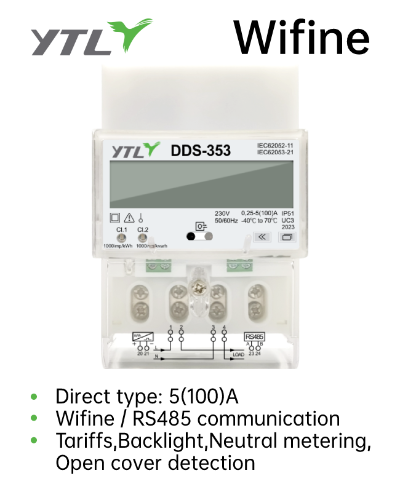 But what exactly is an IoT electricity meter? With the rapid development of technology, the concept of the Internet of Things (IoT) has become increasingly popular in recent years. One application of IoT that has gained attention is the IoT electricity meter.
But what exactly is an IoT electricity meter? With the rapid development of technology, the concept of the Internet of Things (IoT) has become increasingly popular in recent years. One application of IoT that has gained attention is the IoT electricity meter.
An IoT electricity meter, also known as a smart meter, is an advanced metering device that not only measures the amount of electricity consumed by a household or business, but also has the capability to communicate this information to the utility company in real-time. This two-way communication feature sets it apart from traditional electricity meters, which only provide data when read manually by a technician.
The IoT electricity meter is equipped with sensors and communication modules that enable it to collect and transmit data on electricity usage, voltage, power quality, and other relevant information. This data is then sent to the utility company's server, where it can be analyzed and used for various purposes such as billing, load management, and grid optimization. In addition, consumers can also access their electricity usage data through a mobile app or web portal, allowing them to monitor and manage their energy consumption more effectively.
One of the key benefits of IoT electricity meter is their ability to enable real-time monitoring and control of electricity usage. This can help utility companies identify and address issues such as power outages, overloads, and voltage fluctuations more quickly, thereby improving the reliability and efficiency of the electrical grid. By providing accurate and timely data, IoT electricity meter can also help consumers better understand their energy usage patterns and make informed decisions about their electricity consumption.
Furthermore, IoT electricity meter has the potential to support the integration of renewable energy sources and promote energy conservation. With the increasing adoption of solar panels, wind turbines, and other distributed energy resources, it is crucial to have a reliable and flexible grid infrastructure that can accommodate these new technologies. IoT electricity meter can facilitate the seamless integration of renewable energy into the grid by providing real-time data on energy production and consumption. This enables better management of distributed generation and demand response programs.
In conclusion, the IoT electricity meter is a sophisticated device that leverages the power of IoT technology to revolutionize the way electricity is metered and managed. By enabling real-time communication and data exchange, IoT electricity meters offer numerous benefits for both utility companies and consumers. These benefits include improved grid reliability, better energy management, and support for renewable energy integration. As the energy industry continues to evolve, IoT electricity meters are expected to play a crucial role in shaping the future of the electrical grid and advancing the transition towards a more sustainable and efficient energy system.

 English
English 简体中文
简体中文




.png?imageView2/2/w/500/h/500/format/png/q/100)



.png?imageView2/2/w/500/h/500/format/png/q/100)
.png?imageView2/2/w/500/h/500/format/png/q/100)




